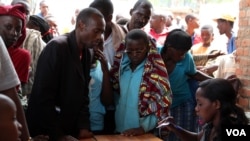Refugees have a positive impact on surrounding host communities, particularly when given cash stipends as opposed to food rations, according to a new study by the UN.
A joint project by the World Food Program and researchers at the University of California, Davis, studied Congolese refugees living in three different camps in Rwanda.
“Our research found that local communities see very real economic benefits from hosting refugee camps, regardless of the type of food assistance refugees received, but it was clear that cash-based food assistance for refugees translates into a larger boost for the people who live near the camps,” said the study’s lead author, J. Edward Taylor.
Taylor, a professor of agriculture at UC Davis, said the team found that real income generated for the surrounding community was larger than the humanitarian assistance received by the refugee, "and if the refugee is receiving cash, the impact of that assistance can nearly double."
When refugees receive monthly food rations, they often sell part of it (at rates lower than market cost) and use the cash to buy vegetables and other fresh products.
“When refugees receive cash instead, it not only gives them more control and choice over what they eat, but also increases their purchasing power, and therefore increases the strength of their contribution to the local economy," said Ernesto Gonzalez, a co-author of the study who works on cash-related assistance in WFP’s regional bureau in Nairobi.
In the Kigeme camp, where refugees received food rations, the study found that every dollar worth of food assistance increased real income in the community around Kigeme by $1.20.
The two other camps, Gihembe and Nyabiheke, where refugees received cash transfers instead, saw increases of $1.51 and $1.95, respectively, for each dollar given.
The World Food Program does warn, however, that food rations are still needed in some camps without functioning markets or where food resources are scarce.
Rwanda hosts more than 150,000 refugees in five camps across the country.
Ongoing conflicts in North and South Kivu, Ituri province and north Katanga in the Democratic Republic of Congo over the past two decades have killed more than 5 million civilians, and displaced millions more. Most have died from preventable diseases as a result of the collapse of infrastructure, lack of food and health care, and displacement.
But the findings are relevant to a much broader global community, as Europe struggles to accommodate and integrate unprecedented numbers of refugees reaching their shores.
A record 65.3 million people worldwide were displaced from their homes in 2015, according to the U.N. refugee agency, the UNHCR — a 10 percent increase over last year. Half of them are children.
The U.N. refugee agency said it is inevitable more people will try to reach Europe because of global inequality in wealth and security.










